




Hello and a warm welcome to our 2024 New Year edition of Foodsight.
I hope you had an enjoyable festive period and wish you all the very best for the year ahead.
As with any New Year edition, forecasting the trends for the next 12 months is always a key theme, and this edition of Foodsight is no different. We take an in-depth look into this from page 22.
But before we delve into that, we open with a summary of all the food and diet related awareness events, month by month, throughout the year. This ready reckoner is aimed to be an easy reference and planning aid for your busy operations.
Next, on page 16, is our regular Commodity Heatmap and Commodity Overview. It is reassuring to see that the majority of reds are turning orange or yellow. Although not yet green, this indicates that the steep prices experienced in 2022 and 2023 have eased from their highs – long may that continue!
This is further explained in our Food Inflation Outlook on page 19, which highlights that CPI food inflation peaked at 19.2% in March’23, slowing to 10.1% in October, which was the last CPI release before going to print. Whilst now at almost half the maximum, 10% is still extremely high for ‘normal’ times!

Oliver Hall Managing Director



On page 26 we have an article about the British Nutrition Foundation Annual Conference, in which we featured – along with our interview for ITN. Do have a watch to find out more about our discussion with Louise Minchin regarding nutrition and sustainability going hand in hand.



At allmanhall, part of our purpose is to ‘allow informed decisions to become clear’ for our clients. On page 30, our Sustainability Manager explains why, as a species, we should reduce our ruminant meat consumption, for the health of the planet. Foodsteps, highlighted in a couple of places in this eMagazine, will help catering operations to plan and measure the impact that they are having in this regard, along with our Dietitian considering the nutritional impact of moving to a more sustainable diet on page 34. Our article on page 56 highlights a connected issue – the impact of eco-anxiety on young people.
We have a number of case studies, which brings operational elements to life and explain how they are implemented in practice. From financial savings, process efficiencies, improved supplier engagement, levering technology and delivering sustainability improvements – all are achievable collaboratively and without trade off!
The penultimate section of the edition of Foodsight shines a spotlight on products. From our interview with Notpla to recommended products through Bidfood.
To close we share what’s currently in our book corner, on our reading list for 2024, and we share our team’s New Year’s resolutions!


At allmanhall we will continue to understand, manage and where possible, mitigate the macro factors. We will maintain and develop relationships on a local level to negotiate terms with our joint suppliers to ensure that we can continue to deliver value and the most competitive arrangements for your organisation.
Please do not hesitate to contact me, or any or the team, if you have any queries or requests.
I hope that this edition of Foodsight is of support and insight, along with Value and Control, being the key pillars of our offering.
With very best wishes for 2024!



Events and food days to look out for this year
Our top picks for 2024
Commodity Heatmap
Informing you on important commodities status
Commodities Overview
Overall commodity updates
Food inflation outlook
Insight into the recent effects of food inflation
Good buns!
2024 is the year of our collaborative, low carbon burger concept
Carbon footprint poster

What does my lunch have to do with it?
Food trends to look out for in 2024
What does my lunch have to do with it?
allmanhall’s ITN interview
Food systems may be vulnerable and fragile, but not broken!
Why we need to reduce ruminants consumption
Theo Kuehn goes into detail on why we need to cut down on ruminants
Understanding the carbon impact of your menus
Add up to 5 recipes or food items for FREE and see the carbon impact data

Eating sustainably… any nutritional considerations needed?
Delivering sustainable value: because good food shouldn’t cost the Earth...
results
Here you’ll find a selection of case studies, across a range of sectors
Welcome to The Pass!
Providing our services, all on one platform!
Introducing The Jackfruit Company
A Jackfruit cookery demo and lots of ideas to share with our clients
We’ve struck GOLD!
allmanhall has been recognised by EcoVadis as a ‘Gold Rated’ supplier
Overcoming eco-anxiety
How to support & empower the next generation
Exclusive interview with Notpla
The future of sustainable packaging
Sustainable product alternatives*
Your guide to new & innovative products
Hero Recipe
Mixed Bean Chilli on Rice (VG)
Our team’s new year resolutions!

Learn more about how our team intends on making this their year
Book corner
The food of bookworms - recommendations for your 2024 reading list
*Includes product codes from brands including...
Notpla, Devil’s Kitchen, Rubies in the Rubble, Fairfields Farm, Wildfarmed Flour, Moving Mountains and Quorn Foods...




Veganuary has inspired and supported millions of people to try a vegan diet since 2014 – with participants from almost every country in the world.
The aim of Veganuary is to promote plant-based eating for the month of January, encourage people to try vegan recipes and products and fall in love with the lifestyle focused on benefitting your health, the environment and animal welfare!

You may not be keen to go fully vegan, and instead just want to reduce how much meat and dairy you consume. Here are some ideas here that help you do that!
• Swap dairy milk for a plant based alternative such as oat milk or almond milk
• Instead of eating pulled pork in dishes, try jackfruit instead
• Switch to impossible or beyond meat for ground meat
Sign up to Veganuary today and recieve updates, free recipes and even cookbooks!

Why not kick off Veganuary with a bang, and try making our very own hero recipe, mixed bean chilli con carne on rice (VG), page 28.
National Pizza day is a delectable celebration of one of the world’s most beloved and versatile foods.

Observed on February 9th each year, it’s a day when people come together to indulge in their favourite pizza creations, whether it’s a classic margherita, a meat-lover’s delight, or the controversial pineapple topping.

Chinese New Year is the festival that celebrates the beginning of a new year on the traditional lunisolar chinese calendar. To celebrate this, an abundance of traditional Chinese food is eaten such as longevity noodles, steamed fish and sticky rice balls...
Otherwise known as Shrove Tuesday, Pancake day combines a delightful sense of celebration and fun with some deep and meaningful components.
Always observed on the day before the religious holiday, Ash Wednesday, Pancake Day is associated with some other names, such as: Mardi Gras, or Fat Tuesday.
Remember, pancake day doesn’t have to be a burden on your nutrition and health.
There are many ways to make and prepare pancake dishes with a healthy & sustainable twist, such as implementing fruit into your recipes or even replacing animal-based products with plant based ones!
For low carbon impact, plant-based, delicious pancake recipe inspiration, click here.





Real Bread Week is an annual celebration dedicated to promoting and appreciating real, handmade bread. This event highlights the importance of traditional baking methods, natural ingredients, and supporting local bakeries.
During Real Bread Week, bakers, bread enthusiasts, and communities come together to organize various events, workshops, and tastings. The aim is to raise awareness about the benefits of consuming real bread, free from additives and preservatives, and to encourage people to enjoy the taste and health benefits of freshly baked, locally sourced loaves.




Red Nose Day is an annual campaign that raises life-changing funds to help end the cycle of poverty and ensure children are safe, healthy, educated and empowered around the world.
Since 2015, the campaign has raised funds that provide medical care, food, shelter, education and more to over 31 million children.

The goal of Nutrition and Hydration Week is to connect with healthcare practitioners working in medical, catering, and care settings, and to use their knowledge to create a fantastic campaign that everyone can get behind.

Roughly three million individuals are facing the risk of malnutrition in the United Kingdom especially those living in care homes due to conditions such as dysphagia.
To learn more about this week, click here.


St Patrick’s Day is celebrated in many parts of the world, especially by Irish communities and organisations. Many people wear an item of green clothing on the day. Parties featuring Irish food and drinks that are dyed in green food color are part of this celebration. It is a time when children can indulge in sweets and adults can enjoy a pint of beer at a local pub.
Many restaurants and pubs offer Irish food or drink, which include:
• Irish brown bread
• Corned beef and cabbage
• Beef and Guinness pie
• Irish coffee
• Irish stew
• Irish potato soup
• Irish cream chocolate mousse cake
• Irish potato champ
As the most celebrated christian holiday, easter always provides delicious foods and events for coming together. As well as the more modern concept of the easter bunny and gifting each other chocolate eggs!
Why not switch up sustainably this year and cut out the chocolate and replace it with a healthy hot-cross buns recipe instead.


National Tea Day, celebrated on April 21st, is a delightful observance that honors the beloved beverage enjoyed by people worldwide. This day is dedicated to the art of brewing and savoring tea, appreciating its rich cultural heritage and diverse flavors.
How to celebrate National Tea Day:
• Learn tea etiquette
• Host or join an afternoon tea
• Try a new tea flavour you haven’t had before

1st - 8th May
Time for a Cuppa Week

By the time you’ve boiled your kettle, another person will have developed dementia. Over 944,000 people in the UK are affected by the condition – if someone you love is living with dementia, you’re living with it too.
Get involved...


11th May
World Fair Trade Day is an opportunity to envision a world where trade helps support small-scale farmers, producers, and their families, cultivating healthy and sustainable communities around the world.

This week highlights to the wider public the benefits and pleasures of a meat-free diet. As more people look to make lifestyle changes, eating veggie is increasing in appeal and National Vegetarian week aims to show to communities and schools across the UK that vegetarian food can be vibrant and exciting to eat.
Whether for health benefits, cost or animal welfare concerns people opt for vegetarian food for personal reasons. National Vegetarian Week offers a chance to dismiss any lingering myths around vegetarian food and its limitations.
Click the laptop to learn more...



UK BBQ Week is an idea born by a group of BBQ enthusiasts who want to show more people how easy and rewarding cooking outdoors can be, 365 days a year.
The great thing about this week is that it caters for all diets including vegan and vegetarian!
I mean honestly, what goes better on the barbeque than a good old corn on the cob?

National Picnic Week aims to encourage people to take the ideal opportunity to get together over a picnic with advice, tips, recipes and information to make sure you have everything from the food and drink to the location or surroundings.
Picnicking is one of the UK’s most enjoyable summer traditions, and is a great way of taking advantage of any open spaces in your local area over the warmer months of the year.
This is a serious day for all of us to reconsider our way of life and usage of natural resources. Our mother Earth can only regenerate resources at a finite rate. But we are utilizing it more than this rate every year.
Earth Overshoot Day was introduced to raise awareness about the resource shortage that we are creating with our modern lifestyle. Once the regeneration of resources is at its limit, we exploit what is left of the resources, making the situation even worse. Andrew Simms started the idea behind Earth Overshoot Day to track the ecological resources and services we use from nature.
So, what are the solutions? Find out here...




Afternoon Tea Week, celebrated annually in the UK during the second week of August, is a charming tradition that pays homage to the quintessentially British custom of afternoon tea. During this delightful week, tea rooms, hotels, and cafes across the country host special events and promotions, inviting people to indulge in the classic afternoon tea experience.
Implementing this date into your calendar, especially in care homes, can be a great way to get much needed nutrients into a diet.
National Burger Day is a delectable occasion dedicated to honoring one of the most cherished culinary creations—the burger. A burger can be made in a variety of ways and served with different toppings to suit the taste of the one eating it. This is why it’s one of the most liked foods and appreciated and enjoyed by so many. Why not try a plant-based patty this year and reduce your carbon footprint?
Organic September is about celebrating the hard work and dedication that goes into growing while working with nature, not against it.
Learn more on how you can do your part here.



#SourdoughSeptember is an event ran across the UK during the month of September where baking schools, flour mills and bakeries will be running sourdough classes, tastings, feasts and more to demonstrate why sourdough is a superior loaf!
The aim is simple: to encourage more people to buy genuine sourdough or – even better – to make their own sourdough bread at home.



#LoveBritishFoodWeek (17th September - 2nd October) is a food festival like no other! By promoting traditional dishes and produce, the festival is among the biggest celebrations in the United Kingdom.
The event takes place at schools, restaurants, supermarkets, and households across the country.


Hosted by MacMillan, this coffee morning is aimed at raising money for the vital work they do. It helps fund their amazing Macmillan nurses, answer calls on our Support Line, give financial support, and more.
You can get involved here.

Enjoying #NationalTacoDay is super easy with all kinds of options that involve making, eating and celebrating everything that has to do with the taco! Try these ideas out for inspiration:

• Go out to a Mexican restaurant
• Try a unique take on tacos
• Have a go at making dessert tacos


7th -13th October
It has often been said that curry is the new national dish of Britian and it’s certianly easy to see why.
Since the 1970’s, curry houses have become a staple of highstreets up and down the country and millions of curries are consumed every single week. The love affair shows no signs of slowing and that’s what we’re celebrating with National Curry Week!
Curry is for everyone, with many plant based dishes as well as ones easy to chew & swallow for anyone who suffers from dysphagia.

31st October
The spookiest time of the year is one of the tastiest, full of treats (or tricks), to satisfy your sweet tooth!
Here is a list of traditional halloween food/drink ideas to try:
• Pumkpin pie
• Apple bread Halloween
• Pumpkin spiced latte
• Pumpkin & lentil soup


World Vegan Day was created in 1994 to mark the 50th anniversary of The Vegan Society, and takes place annually on 1 November. Kicking off 30 days of celebrations for World Vegan Month it’s a time to recognise how far the vegan movement has come, while always working towards our goal of a vegan world.

Diwali, the Festival of Lights, is celebrated in the Hindu month of Kartika. It falls between October and November and the exact dates vary year to year. Like many festivals, food plays a big part in the celebrations and traditions.
From chaat to samosas, barfi to kheer or halwa why not get spicy with some new recipe ideas?


Stir Up Sunday is the day when tradition suggests we should make our Christmas pudding. The tradition dates back to Victorian times when the family would gather five weeks before Christmas to stir the Christmas pudding.
The lead up to this special day allows for a festive flair on all things food, globally!
From switching up classic recipes to their christmas counterparts, as well as traditional dishes eaten at this time of the year being reintroduced.
Of course, we can’t forget the world renouned christmas dinner which varies around the world!
Why not take some inspiration...







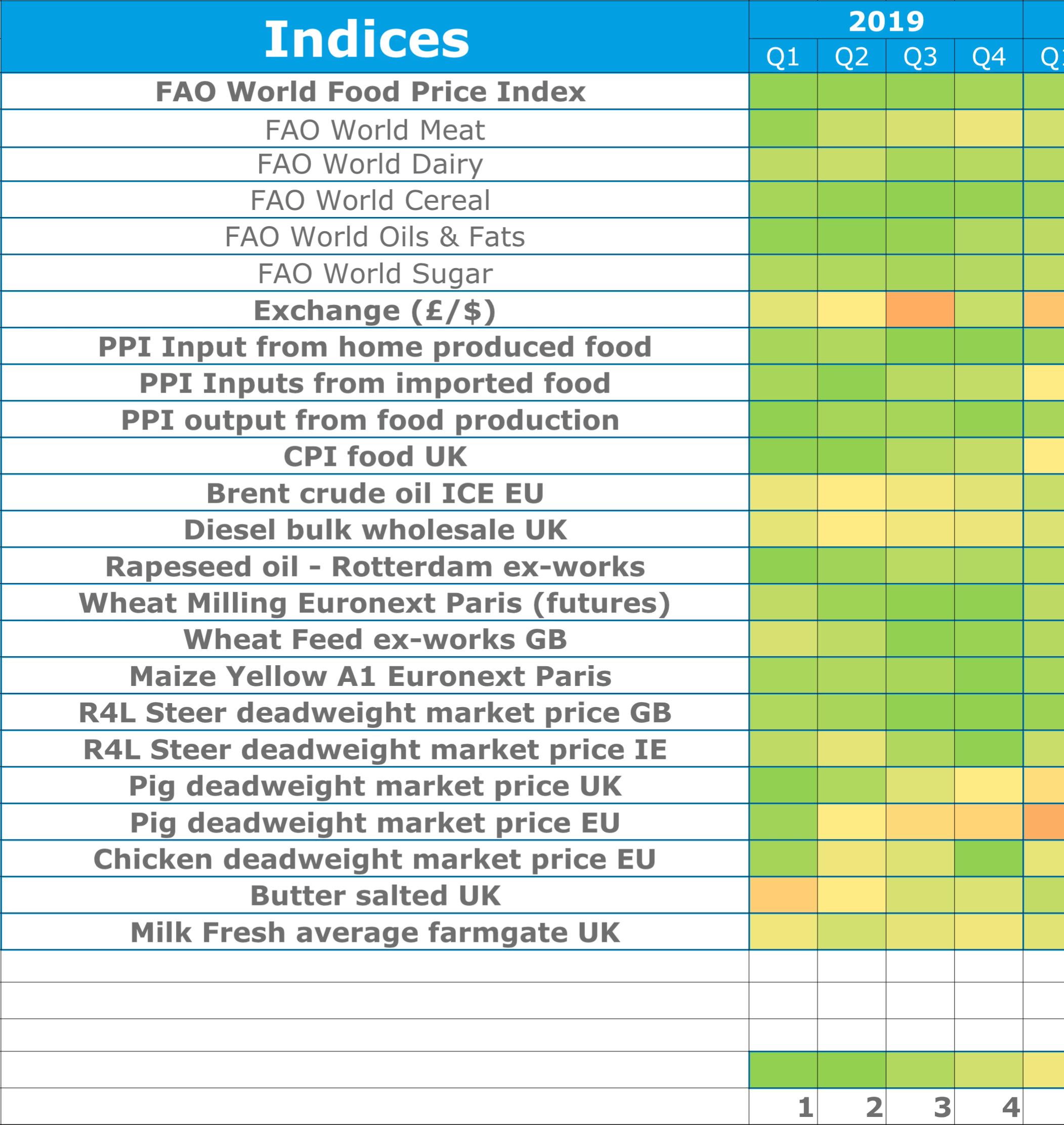

For mobile viewers, to view the whole commodity heatmap, enter landscape mode...

The next heatmap, showing Q4 movements, will be published mid-late January. You can check our blog page for updates then (on The Pass for allmanhall clients).

Over the past three years, escalating input costs, the impacts of climate change, and geopolitical factors have propelled numerous commodity prices to unprecedented highs. Although the pace of inflation has decelerated, there are still persistent challenges.
England recently experienced its wettest October since 2000, significantly affecting domestic farmers.
Large amounts of rain hamper farmers' use of heavy machinery, leading to delays in sowing winter crops and harvesting UK staples, including potatoes.


The copious rainfall has also compromised quality, with some harvested crops displaying signs of deterioration due to excessive water content, potentially causing shortages in 2024.
In the USA, this typically affects corn and wheat yields negatively but positively influences soybean harvests.
Historical trends indicate a rise in global food commodity prices following the declaration of an El Niño event.
Ongoing conflicts in the Middle East and Ukraine further contribute to
Author Tom Codling Buyer



The rate of food inflation, which peaked at 19.2% in March 2023, has slowed, reaching 10.1% in October 2023.
This decline in the rate of food inflation is encouraging, with the IGD predicting its continuation into 2024. However, we must note that this does not imply an immediate halt to price increases. These will likely persist until at least the second half of 2024.

In order to predict future rates of inflation we can look at what food manufacturers are currently paying for raw materials. In October 2023, the ONS reported that manufacturers are still paying 9.1% more than a year ago for imported goods. This further indicates future price increases.
Current factory output prices have been reported as 3% higher in October 2023 compared to last year. This will significantly affect the prices that consumers are paying in the future.
The El Niño effect...


The rate of food inflation still sits considerably higher than the overall rate of inflation, published at 4.7% in October 2023 using the CPI methodology. Whilst this overall value has almost halved since the peak, it is still more than double the Bank of England’s official target of +2%. The rate of food inflation was five times higher than this target in October 2023, with prices around 30% higher than in October 2021 according to the ONS.
Several factors have been contributing to this situation. These include the conflict in Ukraine, labour shortages, and climate change. All of these have and will continue to impact the availability of crucial commodities (see article on page 18).
Additionally, current weather predictions indicate an imminent El Niño event in the winter of 2023/2024 (at the time of writing).
The temperature this winter is expected to peak around +2°C against the seasonal average. This increase is likely to have detrimental effects on producers and exporters in the northern hemisphere.
Regions in Asia, responsible for 90% of global rice production, will experience adverse impacts due to the warmer and drier conditions, which are incompatible with the water-intensive nature of rice crops.
At allmanhall we will work with suppliers to communicate any future supply challenges and will continue to negotiate down proposed price increases, advise on product alternatives and






(and burgers, garnish and sauces too, of course).
But, for now, we’re keeping them covered up. Just for a little while longer.


2024 is the year of our collaborative, low carbon burger concept. We’re working with a group of inspiring partners to bring you a truly delectable burger that won’t cost the Earth.
A lucky few will be given the chance to trial it once the concept is complete.
Until then… shhhhhh!


In the food and beverage industry, trends come and go, some lasting several years and others being a quick burst of activity.
Often, they will branch off into a progression of the original trend and new developments emerge. Looking back on the predicted trends over the past few years, some came to nothing, whilst others have developed and adapted from year to year, bringing new focuses to the food and drink market.
Read on to discover what trends 2024 may reveal!
January: brings Veganuary and an influx of meat-free products. Yet whilst the vegan movement has been a key trend in past years, we have seen this progress through to flexitarianism as a more realistic and widespread approach to reducing meat consumption.
As The Guardian reports, “UK meat consumption is at the lowest level since records began” in the 1970s, driven by the cost of living and consumer lifestyle changes. However, with our requirement to reach net zero by 2050 and the necessary pressure to reduce our greenhouse gas emissions, there is an urgent need to address our meat consumption. Whilst a vegan diet omits meat and animal products completely, and a flexitarian diet reduces meat consumption in general but not completely, reviewing what type of meat we eat plays a vital part in reducing the carbon impact that animals have on our planet.

Looking ahead to 2024, the meat-free movement will progress to address ruminant meats and how we manage these in terms of meat consumption. Categorised by their unique digestive system, ruminants include cattle, sheep, goats, deer, buffalo, elk, giraffes and camels. With four compartments to their stomachs (we as humans have one), the largest of these compartments (the rumen) stores and ferments food as part of the digestive process. Later regurgitated to finish its digestion, the food and fibres ferment in the rumen of the animal and produce methane and other by-products which is then released into the atmosphere and therefore contributes to our greenhouse gas emissions.
Whilst it’s unlikely we will see giraffes and camels on any menu in the UK, beef and lamb are the main culprits in this. With a need to reduce greenhouse gas emissions, the reduction and even elimination of ruminant meats from our menus and diets is a key focus in addressing this.
Unlike a vegan diet, there is no need to remove meat completely, but consumers will be encouraged to follow a trend moving towards non-ruminant meats such as chicken, turkey and pork.

As the trend for a reduced or meat-free diet has progressed over the years, so too has the development in plant-based alternatives. The last couple of years have seen trends in meatless-meat products, imitating the taste and texture of meat but as a product made from plants.
However, last year we also saw clean labelling as a trend, with a focus on reducing the number of ingredients within products, particularly within the plant-based market. As a progression of this, for 2024 we should expect to see a resurgence of the original meat-free products such as the veggie burger.

Foodsight: New Year Edition 2024
With a return to beans, wholegrains and pulses, the ingredients list on meat-free alternatives is likely to be reduced by being vegetables rather than “complex meat alternatives.”
Along with clean labelling, consumers continue to focus on mindful eating, caring not just about calorie content but also the nutritional value of their food and drink. As with previous years, there is a focus on functional eating, with consumers looking for products that support gut health, digestion, skin, joints, focus and mental wellbeing.
Mushrooms are rumoured to be one of the key ingredients, with the Turkey Tail mushroom – used in Chinese medicine – offering cognitive benefits. We may see these being used in functional products including coffee, energy drinks, soups and smoothies.
Mindful eating doesn’t stop at ingredients with more and more consumers making choices based on how and where foods are grown and produced. There is a growing focus on regenerative farming and food, with a shift from solely reducing the amount of harm we are doing to the environment to taking action to restore the land we are farming and encourage biodiversity. In their 2024 trends report, Whole Foods predicts that we will see buckwheat as an ingredient in products such as crackers and granola.
Seen as a “superfood seed” due to its protein content, fibre and naturally gluten free qualities, buckwheat is often grown to help with soil health, meaning as a crop it helps to restore the soil as well as being a nutritious food source.


A big part of understanding how our food is grown and produced is having a traceable and transparent supply chain. This is not a new trend for 2024, but we will see an increased focus on the need for brands to provide full traceability on their products for every stage of the supply chain to prove their sustainability credentials.
Unfortunately, the spreading of misinformation on sustainable practises through greenwashing is existent, and it is likely that more measures will be introduced to eliminate this, particularly in the food and drink supply chain. We may also see an increase in hyper-local sourcing, with restaurants growing their own food, therefore having complete traceability of their produce.
See page 30 for details regarding Foodsteps which can help make full supply chain transparency achievable.
Whilst the behavioural trends from 2023 develop into 2024, we will also see some taste trends that will continue to emerge. There is a growing curiosity for international flavours and offering diversity within our food choices, and whilst we have a vast range of cuisines available in the UK, a lot of these are westernised versions of the original cuisine. Mexican and Caribbean dishes are already popular; however, we are likely to see the development of traditional dishes with new flavours in addition to the ones we know.

Often seen as street food, new recipes might cover breakfast, snacks, food-to-go and mains, and includes recipes that lend themselves to vegetarian and vegan meat-free menus. As part of the authenticity, consumers also want to see traditional cooking styles that bring a true taste of another culture and cuisine.

Despite the increased cost of living, for many eating out is still an important part of their lifestyle, although often seen as a treat. As a result, consumers are looking for dining out to become an experience, to be engaging, and to be focused on quality.
Whether that is setting, cooking methods, theatrics or presentation, younger consumers in particular are looking for the novelty, Instagramable moment and for the trends to extend to the whole dining experience as well as the food itself. With that in mind, the combining of traditional British dishes with other global cuisines is a progressive food trend that balances the exploration of new flavours with British elements that consumers are familiar with and love.
Seen as a ‘safe’ way to try something new, British fusion might focus on favourites such as a roast dinner, pie or fish and chips but with a twist.
Giving consumers the opportunity to discover something new, it reduces the risk of splurging on the unknown by keeping an element of familiarity.

There is no doubt that 2024 will being a wave of newness to the food and drink industry, whether it be the progression of an existing trend or movement, or a completely new product being launched on the market.
It is, however, clear that the trends we have seen from previous years in terms of reducing meat consumption and a focus on reducing food waste are only going to develop and escalate in order to address our carbon emissions and our pledge as a country to become net zero by 2050.
Author Laura Taylor
Group Buyer


”Food systems may be vulnerable and fragile, but not broken!”
This was Duncan Williamson’s opening message.
It set the tone of hope and call to act, now, that ran through the British Nutrition Foundation (BNF) Annual Conference in November. There was a real sense that we should remain positive and responsible – it’s not too late to make a difference. The Conference went on emphasise the need for dramatic change and the key parts each of us can play in doing so. This supports the sentiment provided by allmanhall’s Mike Meek, Procurement and Sustainability Director, in his recent interview for ITN with Louise Minchin.
“Our currently stressed food supply chain requires change.”
Read the full blog, which starts on the next page!


The BNF conference theme, ‘A Fragile Food System and Increasing Inequality’ felt particularly relevant to allmanhall given our absolute commitment to challenging and transforming food supply so informed decisions become clear.
Duncan Williamson, Forum for the Future, kicked off the speakers’ section and highlighted the significant environmental challenges faced as a result of our approach to food production and consumption.
Again, this mirrored the thoughts of our own Mike Meek:
“A food supply system which produces 30% of global greenhouse gases, and where 30% of food produced is never even consumed needs rethinking, In particular tackling waste and moderating demand.”
Mike Meek Procurement & Sustainability Director


Sally Ball, Kantar, then shared insightful findings on consumer trends relating to health and sustainability. Dr. Christian Reynolds, University of London, discussed the changing climate and how our policies and dietary behaviour needs to adapt.

Dr. Adrian Brown ended this part of the session examining the paradoxical link between obesity and food insecurity.
The same things as discussed by allmanhall’s Rachael Venditti in the same ITN interview were addressed:
“Nutrition is impacted by a more sustainable diet. A sustainable diet is also a healthy diet. The principles of eating in a sustainable way that reduces environmental impacts does in fact reflect guidance around what is a healthy diet.

Rachael Venditti
Business Development Manager
Guidelines to a healthy diet are set out in the Eat Lancet planetary health diet, which recommends a diet that is varied and is the right quantity for the individual to reduce waste as well as obesity or equally malnutrition. A diet that includes plenty of fruit, vegetables, whole grains and plant-based proteins is recommended. And yes, a small amount of meat, fish and dairy too.”
allmanhall’s nutrition for life interview:

The British Nutrition Foundation Annual Conference, held in London, included the launch of the ITN news style programme, Nutrition for Life, in which allmanhall were interviewed.
The day also marked the recognition of annual awards, celebrating those making real contributions to nutrition. The 2023 BNF prize was awarded to Professor Sir Michael Marmot.
The event culminated in a fantastic lecture from Professor Julie Lovegrove, last year’s winner of the BNF Prize.


Food production is making a significant environmental impact. We are at a critical moment in time where real change needs to happen. There are signs that dietary patterns are more sustainable, but the pace of change needs to accelerate. Policies and trends must encourage healthy sustainable diets.

As already mentioned, the event also marked the launch of the incredibly insightful and informative BNF Nutrition for Life programme, in partnership with ITN Business. allmanhall were delighted to be invited to contribute to this programme.
Our Procurement & Sustainability Director, Mike Meek, and Business Development Manager & Nutritionist, Rachael Venditti RNutr. Were interviewed, discussing the critical areas of sustainability and health.
The highlight had to be Mike’s shout out to the humble bean!
You can watch the full interview below…



What we eat and choose to avoid is a complex emotional decision. Human consumption of meat, is complex, and based on a variety of reasons, like taste; cost; culture and ethics. However, as we look towards future sustainable food systems, we need to reevaluate the role meat plays in our diets.
Indicates that to limit global warming to the 1.5-degree target of the Paris treaty, we need to limit food related emissions to 1.85kgs of Co2e per 1kg produced. When beef has an impact of almost 100kg, it becomes clear to hit this target things need to change.
Ruminant animals are also the second largest cause of methane emissions, a greenhouse gas with almost 30 times more global warming potential than Carbon Dioxide.
Meat is inefficient to produce, requiring far more feed, water and land to produce than almost any other food. 77% of the world’s agricultural land is used to produce meat and dairy, which only provides 18% of global calories.
Should we all switch to a plant-based diet, we could feed the world using ¼ of current global agricultural land.
Each kilogram of beef requires 25kgs of feed, 15,415L of water, and produces around 100kg of Co2e.
Another excellent protein source, a kilogram of kidney beans, only requires 4055L of water, and produces 0.56kgs of Co2e.
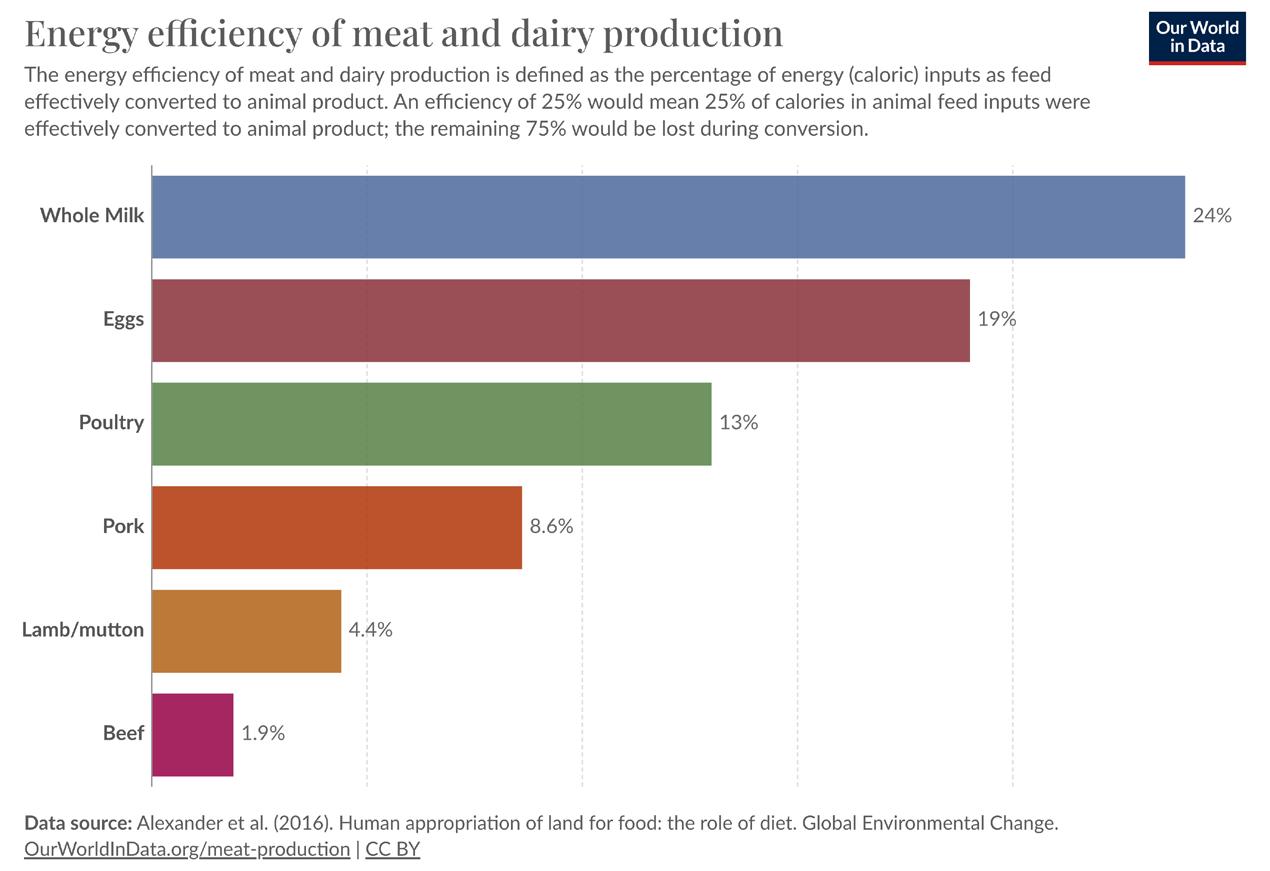
Despite this high environmental cost, per capita meat consumption has doubled globally since 1961, from an average of 21kgs to 43kgs per annum. Forecasts indicate this is due to increase exponentially, compounded by the fact that we need to grow more food between now and 2050 than the last 10,000 years combined.
This is not to single out meat and its carbon impact as the only issue facing us. It is merely one example of the wider systemic issues revolving around our relationship with food. This doesn’t capture other concepts, such as biodiversity loss from deforestation (beef alone is a leading cause in deforestation), feed food competition, or the growth of antibiotic resistant bacteria.
The solutions to these issues exist and are scalable. They simply require behavioural change. Low impact diets are gaining traction, capable of producing more calories with lower resource allocation, all whilst having a myriad of health benefits.
Shifting diets is the single greatest lever we can pull, to align our food systems to the 2-degree warming limit by 2050. On an individual basis, eating meat sparingly, consuming hero dishes (dishes that benefit person and planet), or not consuming ruminants have demonstrable positive impact on the planet.

For more information, or assistance in your decarbonisation journey, please contact allmanhall today.

Author Theo Kuehn Sustainability Manager


Add up to 5 recipes or food items for FREE and see the carbon impact data, instantly!*
Foodsteps is so easy to use and great for communicating and understanding carbon impact assessments of your food.
Together, you and your diners can make a difference.



If you like what you see, simply ask allmanhall for advice about the best option for you and how to access competitive rates.

Scan to sign up for your FREE 5 recipe trial today!

As part of their ongoing mission to bring clarity to food-related emissions, Foodsteps have recently added packaging analytics and emissions to the platform.

You can now add the packaging you're using, for example, the boxes used to store prepared foods. This carbon impact will be assessed and added to the recipe. This covers a wide range of packaging options and the components on the platform can be edited to fit your unique packaging usages and then added to every recipe that is relevant.
This provides further accuracy when bringing transparency to menu choices, and is another invaluable area of focus when looking for ways to decarbonise your menus.
Foodsteps will help your business educate and inspire your customers throughout their sustainable food journey with carbon rating labels...

Author
Delivering sustainable value: because good food shouldn’t cost the Earth...
What is a sustainable diet?
The terms sustainable diet and plant-based diet are still misunderstood by many of the population, with many thinking they mean a vegan diet. However, both terms can include some meat, fish, eggs and dairy.
A sustainable/plantbased diet means a move to a dietary pattern that has a greater emphasis on foods derived from plants. This means foods such as fruits and vegetables, wholegrains, pulses, nuts, seeds, and oils, but can include smaller amounts of meat, poultry, fish, eggs and dairy products.
When considering the nutritional implications of a sustainable/plantbased eating pattern, it is important to grasp what this looks like. And then to understand what, if any, are the relevant nutritional considerations.



What does a sustainable diet looks like?
What our current diet looks like
In the most general terms, as a population our current diet is not sustainable or healthy.
The most recent UK National Diet and Nutrition Survey (NDNS) data shows that our population’s intakes of saturated fat, sugar and salt are above the Government recommended levels.
Whereas intakes of fibre, fruit, vegetables, and oily fish are below Government recommendations.
Our current dietary habits are fuelling obesity, type 2 diabetes, heart disease and some cancers.
In the UK, the Eatwell Guide provides a model for a healthy, varied diet. It is estimated that if everyone in the UK adopted this diet, it would lead to reductions in associated GHGE (45% lower) and land use (49% lower).
Following the Eatwell Guide means eating at least 5 portions of fruit and vegetables a day, wholegrain and higher-fibre starchy foods, and diversifying protein intake more towards plant sources. This includes beans and other pulses, as well as plant-based meat alternatives.
It also includes nuts if safe to do so, alongside eggs, some dairy foods or alternatives and sustainably sourced fish. This should be done whilst also limiting consumption of foods high in fat, salt, and sugar.



A recent study found increased adherence to the recommendation on reducing red and processed meat consumption was associated with the largest decrease in environmental impacts and carbon footprints.
This same study found if everyone in the UK consumed a diet in line with these recommendations, it would lead to significantly less type 2 diabetes, coronary heart disease, stroke and cancer.

Here we set out some of the specific nutritional considerations of moving towards a more environmentally sustainable diet.
Protein: is often the nutrient of concern when switching to a more sustainable diet. A summary of evidence from the BDA’s The One Blue dot has shown neither protein quality nor quantity is compromised when switching to more plant based diets.
This is true whether meat and dairy are included at reduced quantities or if they are totally excluded. Plants contain all essential amino acids and vegan diets can meet all essential amino acid requirement.
Current UK protein intakes exceed the recommended daily intake, including those following a vegan diet (The One Blue dot).
Protein tip: Protein intakes are already in excess. Reducing meat will not negatively impact protein intake, if replaced with a variety of different plant-based proteins. Beans and lentils are particularly nutritious, often described as power houses for nutrition, high in protein, fibre, micronutrients as well as the bonus of being cheap.
Fibre: Our current diets are particularly poor when it comes to meeting our fibre requirements. In the UK, the average fibre intake for adults is only 18g a day. The recommendations for fibre intake are; 30g per day for adults, 20g for 5-11 year olds and 25g for 11-16 year olds.
Evidence suggests that diets rich in fibre, particularly cereal fibre and wholegrains, are associated with a lower risk of many health conditions, including cardiovascular disease, coronary events, stroke, type 2 diabetes and colorectal cancer.
Fibre tip: A sustainable diet will increase your fibre. Beans / lentils, fruit and vegetables are all high fibre sources and eating more of these is likely to have positive health benefits.


Iron: Red meat is a key source of iron. Low iron stores remain an issue for young women in westernised societies, however the prevalence of iron deficiency anaemia (low haemoglobin levels) remain relatively low. SACN indicates that reducing red meat in high consumers (90g+ /day) will not compromise iron intakes.
However, in more vulnerable groups - such as toddlers, girls and women of childbearing Age - low iron intake is a concern. Low iron stores remain a health issue (even with current high intakes of red meat). However interestingly there has actually found to be no difference in the prevalence of anaemia between vegans, vegetarian, and omnivores.
Evidence of an increase in iron deficiency anaemia amongst those consuming diets mostly based on plant foods, such as vegetarian diets, is lacking.
Iron tip: Iron requirements can be achieved by ensuring plenty of plant-based iron sources such as fortified breakfast cereals (preferably not ultra-processed or high sugar options), as well as nuts, seeds and vegetables. And by including red meat in small amounts. This is particularly relevant if concerned around intake for more vulnerable groups, such as young girls, older adults with low intakes.

Zinc: Red meat is also a key source of zinc. Teenage boys and girls have significantly low intakes. Plant sources, with the exception of mycoprotein, are lower in zinc. SACN modelling estimates that red and processed meat contributes 32% of men’s total zinc intake and 27% of women’s.
Zinc tips: Consuming a small amount of meat will likely achieve zinc requirements. Including more seeds and choosing wholemeal/wheatgerm breads will also contribute to zinc intake as well as including Quorn as a meat alternative, which has a similar content to beef. Vulnerable groups not consuming any red meat may benefit from taking a nutritional supplement.

Calcium: Most non-organic plant-based drinks are calcium fortified with a similar content and bioavailability to dairy milk. Therefore switching some or all of your milk to plant-based milks or yoghurts will have no significant detrimental effect on calcium intake.
Calcium tip: Switching some or all of milk to plant-based drinks will have little or no impact on calcium intake due to fortification of these products, however be careful with organic products as these may not be fortified.
Foodsight: New Year Edition 2024
Iodine: The majority of plant-based drinks are not fortified with iodine. However, although dairy does contribute to iodine intake, if some dairy is still being consumed along with small amounts of other animal foods such as fish, seafood, yogurt and egg, it is likely that adequate iodine intake would be achieved.
Some vulnerable groups on a vegan diet may need to consider the use of an iodine containing supplement.
Iodine tip: If still consuming small amounts of meat, fish and dairy, a deficiency of iodine is unlikely to be an issue. Plant-based sources include wholemeal bread, lentils, seeds and beans, tofu. Some on a fully vegan diet, however, may need to consider a supplement.
Vitamin B12: Vitamin B12 is only available from animal sources and a few fortified plant foods. For most adults still consuming reduced amounts of meat, dairy, and eggs, achieving recommended amount should not be a challenge.
B12 top tips: Reduced amount of meat, fish and diary is unlikely to impact on B12 status, as only small amount of these foods needed to meet requirements. Plant-based sources include fortified breakfast cereals and plant-based milk, and marmite. A vegan diet would need a supplement.
Omega 3: A sustainable diet includes 2 portions of fish a week, one which should be oily to ensure sufficient omega 3 fatty acids EPA and DHA.
Omega 3 tips: Aim to follow the Government recommendation for 2 portions fish per week, one being oily, to meet omega 3 recommendations. Those not eating fish will need to include nuts and seeds such as walnuts and pumpkin seeds or consider a supplement to meet omega 3 requirements.



All the evidence shows moving to a more plant-based diet will have a positive impact to our health and will meet our nutritional requirements. A sustainable/ plant-based way of eating doesn’t need to be vegan or vegetarian, and can include small amounts of meat, fish, and diary. For this reason, for the majority of us, there is no negative impact, but only positive health - and also sustainable - benefits.
So, what’s stopping you, open that tin of beans or lentils and add some to your dish today!
For more on this topic, watch our ITN and British Nutrition Foundation interview...


Ask the team at allmanhall for more details or for support!
The School Plates Awards are our way of recognising the positive steps you are taking to make your menus healthier for children and our planet.
There is no cost to you to take part. It is simply our reward for your amazing efforts.
We have created a checklist of school food actions we advise you to take – most of which are evidence-based actions that are proven to help children to eat healthier and more sustainable meals.
Depending on how many of these actions you have taken, you may be awarded with a Bronze, Silver or Gold Award in exchange for your great work.



Here you’ll find a selection of case studies, across a range of sectors, evidencing real solutions and results which have benefited our clients…

Authors Jo Hall & Hayden Hibbert Directors


For over 16 years allmanhall have been specialising in food procurement support and foodservice consultancy for catering teams in education settings. allmanhall currently support over 120 schools, a number of which are multi-academy trusts (MATs).
From reducing costs and improving efficiencies, to enhancing compliance or enabling sustainability goals, one thing these clientpartners have in common is a requirement for a trusted partner who can bring support and improvement to their schools.
This case study explores 2 examples of MultiAcademy Trusts benefitting from allmanhall’s support:
Nurture Academies
Trust is comprised of 6 primary schools. The Trust has a vision of bringing communities together and nurturing excellence.


Trust is made up of 4 schools and places high importance on academic progress and attainment whilst recognising that a primary education should be full of inspiring and memorable life enhancing variety. allmanhall are proud to be able to work with them both and to support their food offering and the pupils’ experience.
Nurture Academies
Trust initially approached allmanhall with a need for consultancy. Their overall objective was to reduce costs, improve efficiencies and visibility of data and to become compliant with the school food standards. Some of the schools are totally HMC level Halal and managing this was proving difficult – they needed support with this very specific need.
HEART Academies Trust had previously been with another procurement provider but were looking for a partner that could also provide consultative advice from a team who really understand hands-on school catering. They were looking for a full scope of support in addition to the core procurement services and to enable innovations in their foodservice offering, improvements to their procurement and steps towards their sustainability goals.
HEART Academies Trust:
• Bedford Academy
• Cauldwell School
• Shackleton Primary
• Shortstown Primary
Nurture Academies Trust:
• Byron Primary
• Denholme Primary
• Fearnville primary
• Lapage Primary
• Parkwood Victoria
For Nurture, allmanhall introduced a catering control platform. This has given the Multi-Academy Trust the opportunity to introduce a number of cost-saving exercises, such as the introduction of weekly stock taking to enable a better management of cost. allmanhall have also introduced a fixed ABL to ensure compliance and regularly analysis of the menus.
allmanhall have introduced waste management and have streamlined the supply of chemicals to one supplier, ensuring that they all meet the religious and multi-cultural requirements of the staff and pupils: for example, there are no alcohol-based products. The senior client at the Trust often makes use of the regular support offered by his Senior Relationship Manager at allmanhall to discuss ideas and challenges and to check compliance across all catering aspects. In addition to this full support, the original like-for-like weighted benchmark allmanhall undertook on Nurture’s behalf demonstrated a saving of upwards of 8%.
For HEART Academies, allmanhall have streamlined the supply chain and supported the introduction of an on-site café. This has included providing visits to Bewley’s to identify the correct machinery and coffee offering as well as sourcing branded cups and aprons in line with the Trust’s sustainability agenda. allmanhall introduced Real Wrap, to provide a high street-esq approach to their grab and go offer. Via Nisbets, allmanhall were able to help the Trust benefit from a 20% saving on equipment purchased for the café. allmanhall are currently working with HEART Academies regarding the possible introduction of Foodsteps carbon impact assessment platform, making data accessible to the catering teams and pupils, as well as exploring waste management solutions.
All of this support has been in addition to day-to-day supply chain management and ongoing cost savings and price negotiations on behalf of the Trusts, as well as more general consultative advice.

“allmanhall’s support so far has been so much more than simply supply chain management and price negotiation, as valuable as that is. They offer a consultative approach and full support, understanding and enabling our objectives and really taking onboard our specific needs and challenges.
We started our relationship with allmanhall on a consultancy basis and have expanded their remit – evidence of how satisfied we have been with the service they provide. The team truly understand catering in education.”
– Nigel Donnelly, Nurture Academies Trust


In 2022, Affordable Housing and Healthcare Group (AHH)’s procurement lead engaged allmanhall to provide a solution for their food procurement and identify deliverable cost savings without compromising on quality, improve the service of suppliers and eliminate the burden of administrative tasks through a central billing solution.
Drawing on the experience from allmanhall’s dedicated mobilisation team, expert support was provided to catering teams across the AHH community, in addition to demonstrating significant cost savings.
Affordable Housing and Healthcare Group (AHH) is a social infrastructure group coinvesting to create long-term holding and affordable shared ownership housing.
AHH partnered with food supply chain experts allmanhall to provide food procurement for their growing community of 4 Encore Care Homes and 5 Platinum Skies Retirement Villages, comprising over 300 care home beds and more than 500 homes.
Encore Care Homes offer residents home cooked, balanced, nutritious meals, and Platinum Skies Retirement Villages feature a range of communal facilities including their exclusive Bistros. AHH’s Head of Hospitality and Procurement was looking for a partner to provide full management of the food and catering related supply chain...


AHH required assistance with supplier and platform related activity, to benefit from more competitive pricing, alongside a reduction of administrative time through a central billing system to avoid processing their 2,904 annual catering invoices.
It was essential that supplier changes did not cause disruption to their sites, so with allmanhall’s dedicated mobilisation team and robust process and experience of change management, the required solution was delivered through regular mobilisation meetings to ensure all activity and integration was successful.
AHH’s key objectives were:
• Identify deliverable cost savings
• Central billing
• Ensure the quality of products is not compromised
• Maintain and improve the service of suppliers
• Ongoing support and expertise
Hamble Heights, a private care home in Southampton, a member of Encore Care Homes.
The first benchmark for AHH resulted in a 9.4% saving and since mobilising in November 2022, allmanhall’s team of CIPS qualified buyers, secured better pricing and an improved service from suppliers. A smooth mobilisation process was achieved through hands on support from our finance, helpdesk, technical, operations and dietetic teams.
Utilising the industry-leading catering software provided by allmanhall, AHH were able to improve their overall visibility of where food budgets were being spent, with streamlined stock control, and administration efficiencies by consolidating their catering invoices into one monthly invoice. In addition, AHH have access to insights, news and updates on inflation, commodities, food trends, nutrition, and legislation. A great help and value add support for their procurement, acting as an extension of the team.
“allmanhall have greatly minimised the time we spend on admin, and we now have complete transparency and visibility of our food spend, enabling us to confidently demonstrate efficient cost effective practices to our residents. Having a local client relationship team who are always happy to support, has been really valuable”.
Amy Nemeth, AHH, Head of Hospitality and Procurement


In a recent tender, Salisbury NHS Foundation Trust was looking for a proactive and supportive partner. Their needs found a good fit with allmanhall’s approach to delivering sustainable value and the Trust has been impressed with the quality and delivery of what they have seen from allmanhall so far…
Salisbury NHS Foundation Trust has always operated an in-house catering service and previously worked with a procurement partner to support the catering purchasing. However, in early 2023, their incumbent contract came to a natural end. This generated the need to re-tender their food procurement service to test the marketplace in line with the public spending purchasing regulations adhered to by the Trust.


The tender was for a fully managed procurement service for the catering department at Salisbury District Hospital. The operation includes freshly cooked patient feeding, production of circa 1,500 meals per day, as well as two staff and visitor restaurants. allmanhall was awarded the contract and immediately started scoping the Trust’s requirements to ensure objectives, priorities and challenges were fully met.
The Trust’s key objectives were:
- Full supplier management
- A proactive and supportive partner to drive commercial and operational efficiencies whilst improving quality
- A user-friendly tech platform to drive improvements and to include functionality such as e-ordering, e-invoicing, recipe and menu management, allergen and nutrition management, patient ordering
- Support service improvements Collaboration to enable the Trust’s focus on sustainability.
- Access to comprehensive and accurate reporting (financial and operational)
- Collaboration to enable the Trust’s focus on sustainability.
Through the tender process, allmanhall demonstrated the ability to achieve all the above and more. The Trust was reassured that the fully managed catering procurement service from allmanhall would:
• Deliver full supplier management
• Ensure ongoing competitive pricing
• Tender all categories

• Mitigate cost pressures, increases and risks via supplier negotiations
• Support sustainable sourcing and a transition to net zero supply chains
• Provide proactive range management and continuous review of purchases to…
• … Identify more cost-effective alternatives (buy right analysis)
• Aid food safety compliance, audits & accreditations
• Lead in supplier due diligence audits
Salisbury NHS Foundation Trust awarded the contract to allmanhall and the awardwinning support from the independent food procurement experts started immediately, with a dedicated team handling the mobilisation of accounts. The multiple stakeholders were kept fully informed via weekly progress meetings and regular training, onboarding was provided to the team at the Trust, for peace of mind and to ensure the change was smooth and effective.

NHS Salisbury District Hospital, Wiltshire.
The contract has some very strict criteria and KPIs. This included securing continuity of supply from some of the local suppliers already engaged with Salisbury NHS Foundation Trust. allmanhall engaged with them at the request of the Trust and started their onboarding process. This included establishing them on a catering controls platform. Industry-leading technology provided by allmanhall as part of the full procurement solution. This is the platform that the Trust would go on to use for everything from e-ordering to credit notes; stocktaking to menu management and costing; allergen management and patient ordering.

The start of the relationship between allmanhall and the Trust has been approached as two key phases:
Phase one – onboarding all suppliers, including client-nominated and local supply partners of the Trust, to ensure a smooth transition and continuity of service for both patient and staff catering.
Within phase one the following was also completed:
• All existing suppliers and a new supply base were onboarded, and the continuity of service was maintained
• All relevant staff within both the finance and catering operational team received platform training and orders were placed online from day one
• A large charity event that was happening immediately, at the very start of the contract, was fully supported by suppliers, facilitated by allmanhall
• Product samples were sent to the Retail Manager to support the introduction of new lines into the public restaurants
• All staff introduced to The Pass – a client portal created by allmanhall to streamline communication and provision of information and resources
• A session to fully scope the approach to support the Trust’s journey to achieve sustainable sourcing and a transition to net zero supply chains.
Phase two – allmanhall are ensuring ongoing competitiveness and that the requirements of the Trust continue to be met, whilst introducing:
• Recipe and menu compilation on the catering controls platform
• Bedside e-ordering for patients
• Electronic stock-taking
As part of phase 2, allmanhall are also supporting:
• Further development of the retail offer
• Establishing a vegan offer
• Achieving Silver Food for Life
• The Trust’s sustainability focus and goals.

allmanhall are providing a fully supported approach to food procurement for Salisbury NHS Foundation Trust, with a focus on real results and high standards straight away, together with a collaborative approach for the long term.
For more case studies like this, visit our website.

Independent School of the Year, Epsom College continues to lead the way in educating pupils about the carbon impact of their food, as well as making pupils’ dining experience more sustainable. Their journey began in mid–June 2022, when Epsom College took the decision to increase the transparency and availability of data by assessing the carbon impact of their menus. This is made possible through an exclusive and pioneering partnership for the planet between the school, allmanhall and the award-winning recipe assessment platform, Foodsteps.
As well as making pupils’ dining experience more sustainable, they have been embarking on a journey to combine this with nutrition and dietetic information, to enable truly informed choices. And added a focus on waste reduction, too. Read on to learn more and for inspiration…
Epsom College has now input and analysed 1000 recipes through Foodsteps.
Those recipes with a lower carbon impact have been designated as ‘Hero Dishes’ and promoted to the pupils as more sustainable options. Other recipes have been ingeniously re-engineered by the Epsom team, to reduce their carbon impact whilst maintaining the taste, texture, appeal and nutritional benefit of these dishes.
One of the most effective methods of significantly reducing the carbon impact of a recipe is to reduce or replace the high intensity meat content, especially beef and lamb. The Epsom College Chefs have managed to do just this!
Examples include: the reduction of the lamb content of a curry dish from 120kg to 80kg through the addition of sweet potatoes and peppers; the content of a beef lasagne was reduced and replaced with Quorn mince; a Ragu incorporated roasted winter veg and a meatball dish combined regular meatballs with innovative pea protein meatballs from Devil’s Kitchen.



The team have also switched to using Wildfarmed Flour for all in-house production. This flour is produced using regenerative farming techniques and is carbon negative. It is used for a variety of purposes including all home-made cakes and recently 4000 mince pies!


Epsom College recognises that the production of the core menus is just part of the journey, and with allmanhall’s support they have introduced a range of other super sustainable and innovative new products, which without exception have proven popular with the pupils.
“At Epsom College, we are continually looking at the ways in which we can become more sustainable and teach our pupils about the food that they eat, where it comes from and the environmental impact of food choices…
we need to look at the food itself and this was a key reason why we chose to enter into this partnership with allmanhall and Foodsteps. It has been incredibly insightful and informative so far, for both my team as well as our pupils.”

- Mrs Bev Spencer, Director of Catering at Epsom College
All ketchup and mayonnaise have now been replaced by the ‘Rubies in the Rubble’ range of condiments. Their ketchup is sweetened using ingredients that would otherwise go to waste and contains less than half the refined sugar than other brands. Their mayonnaise is made using aquafaba, a plant-based alternative to eggs, so it is vegan and free from the main 14 allergens, as technically any food is an allergy.

Ask us about hero dishes!
“We actually managed to achieve the reduction in meat content without the majority of pupils noticing. Wherever there is a ‘wet dish’ you can replace the meat with a selection of creatively prepared vegetables or pulses…or indeed a meat alternative such as Devil’s Kitchen.’’
- Andy Trowell, Executive Head Chef
Over 700 pack lunches a week now include Fairfields Farm crisps which are handcooked and produced using 100% renewable energy. The school’s fantastic new Mermaid Café only uses the Notpla brand of takeaway containers. Where conventional containers have petrol-based coatings that stick around forever, this one has a 100% natural seaweed coating. Once finished, the whole package can be composted and disappears without a trace - just like a fruit peel.

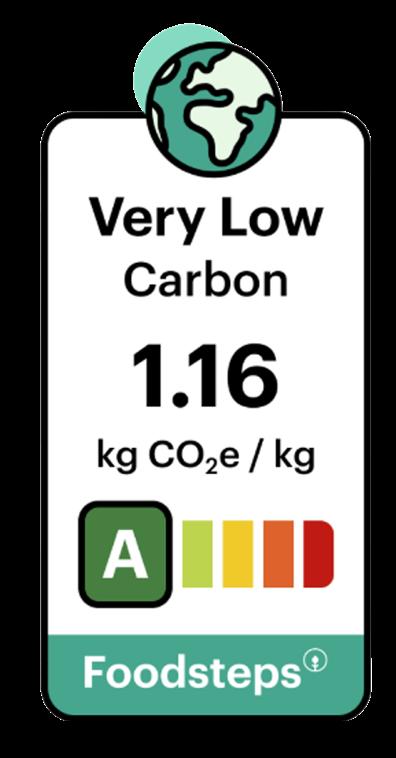
Epsom College is also tackling food waste in a big way, as in the UK we waste up to 1/3 of our food.
Using helpful tools available online through ‘Guardians of Grub has monitored and recorded waste and identifies where it is most prevalent.
The findings were shared with the pupils’ Climate Committee, and a consultative approach taken to incentivise a reduction in plate waste.
Hannah Yeatman, Kitchen Compliance Administrator said:
“After much enthusiastic discussion the pupils suggested that a favourite treat could be awarded for a significant reduction in plate waste – the vote decided unanimously for our homemade extra smartie cookie – and in the last week of November, plate waste was reduced by an amazing 178kg!’’


Foodsight: new Year Edition 2024
Providing our services, all on one platform!
Starting originally as a way for our clients to view their invoices, as well as some other key management information, The Pass has quickly grown and adapted to become a key platform amongst our clients...






We regularly update our provided market reports, research, news and even supplier catalogues so that they can always stay that one step ahead, which in catering, is absolutely ideal!
Can you believe we provide even more than what we mentioned above? We also have low-carbon recipes backed by Foodsteps on there and a Chef’s Corner which is brimmed with useful content to help caterers in their everyday life.






No more trawling through emails looking for reports & resources or having to remember URL’s for case raising or ordering tools...
Everything you need, all in one place, at the touch of a button. by



We were delighted to host Adrian Beale, co-owner of Buckley & Beale Ltd on behalf of The Jackfruit Company at the end of last year, at allmanhall HQ.
Adrian treated us to a jackfruit cookery demo and served up lots of ideas to share with our clients.
It was inspiring, insightful and interactive, not to mention delicious! Adrian made us jackfruit chilli, jackfruit 'coronation chicken' sandwiches and even a jackfruit shepherd's pie. He showed how it can be used as a total alternative to meat or used blended to reduce meat consumption. The pie was 90:10 and was astoundingly good...
In our humble opinion!

What was mentioned in the demo?
The demo kicked off with some key facts about The Jackfruit Company as well as Jackfruits in general!
Adrian was incredibly informative on the history of jackfruit, and little to our knowledge informed us that the fruit has been enjoyed across the Caribbean, Asia and South America for hundreds of years and is considered a staple food.
He also went into great detail on the differences compared to other vegan meat substitutes as well as their lighter packaging compared to tins.
”It was interesting to find out more about jackfruit, with its meaty texture and ability to absorb flavours, it would be great used in meat dishes to reduce the overall meat content and increase the fibre in the dish, rather than as a protein substitute on its own due to its lower protein content.”



1. Natural - grown, not designed
2. Nutritious - high in fibre
3. Sustainable - doesn’t need commercial farming
4. Ecological - low carbon footprint

5. Zero waste - using waste, not creating more...
Jackfruit is well known for its fibrous ‘meaty’ texture.
However, jackfruit isn’t trying to replicate meat, instead being seen as a seperate product that eventually people would rather pick over meat purely down to preference and taste!
Adrian made it clear that for The Jackfruit Company, its all about great-tasting, healthy, natural replacements for meat, that appeal to everyone.
He then went into deeper detail on what The Jackfruit Company actually offer: Unflavoured, cooked jackfruit, perfect for creating reduced meat and meat-free savoury dishes.




• 865g pouches
• Pre-cooked, yet still as moist as fresh jackfruit
• 5 pouches per case
• 125 cases per pallet
• Produced in a BRC Grade A facility
• Ambient storage
• 18 months shelf life from production
”Understanding the sustainability of this fruit, normally portrayed as a firm white canned item used as a meat alternative, provided valuable insights. Receiving this fruit in a more accessible and cost-efficient form highlighted its ability to absorb rich flavors and emerge as a cost-effective viable and environmentally friendly option for catering purposes.”
Sam Llewellyn, Buying Analyst, allmanhall
”I walked away from the demo with a new found knowledge of the world’s largest fruit and the inspiration to add it into more of my cooking, especially trying to recreate the mixed beef and jackfruit chilli!”

Adrian made it clear that the jackfruit is an incredibly flexible fruit and tastes delicious in a wide range of food products...
Due to its lack in natural flavour, its easy to influence flavours on jackfruit when cooking it such as barbeque sauce, or even vegan based broths for a completely animal product free dinner!



Theo Kuehn, Sustainability Manager, allmanhall
”It was fantastic to see The Jackfruit Company and taste their product. As we seek to decarbonise our meal choices, a delicious, abundant, all-natural product with a low carbon footprint is a wonderful inclusion in everyones diets.”
Ben Pope, Buying Analyst, allmanhall
”I thought it was very insightful and opened my eyes to the world of jackfruit. I liked the approach that jackfruit isn’t to be seen as a meat substitute but more of a complementary ingredient, the dishes backed this up and were very tasty.”
When asked by a member of our team, Adrian informed us that young, unripe jackfruit is like a sponge, waiting to absorb anything it comes into contact with. If packed in tins, it would absorb the water - greatly reducing its ability to absorb flavours when cooking!
High amounts of added water also reduce the nutrition levels, such as fibre and protien, by as much as two thirds...
The solution? Don’t add water in the first place.
In pouches, the same jackfruit makes better quality, tastier, healthier, more nutritious meals, without the waste (just one truckload of tinned jackfruit can contain up to 18 tonnes of water).

In the latest annual assessment, allmanhall has been recognised by EcoVadis as a ‘Gold Rated’ supplier…
Mike Meek, allmanhall’s Procurement & Sustainability Director had an announcement to make.
”I’m really pleased to advise that following our annual sustainability assessment, Ecovadis have rated allmanhall as ’Gold rated’.
This international rating system which covers ethics, sustainability and governance puts allmanhall on the 94th percentile of global businesses assessed.”
Read the full blog here:
https://allmanhall.co.uk/blog/allmanhall-become-an-ecovadis-gold-ratedsupplier
Find out more about our sustainable supply here: https://allmanhall.co.uk/sustainability

Mike Meek Procurement and Sustainability
Director



Thanks to news streaming channels and a barrage of social media, every day we are faced with the harsh reality of our rapidly changing world, through reports of scientific data and stories from around the globe.
Watching the world around us change, combined with feelings of personal guilt or witnessing climate indifference in our local community, can be frightening and completely overwhelming.

This phenomenon is known as eco-anxiety, often defined as extreme worry about current and future harm to the environment caused by human activity and climate change.
Eco-anxiety levels in young people are increasing exponentially as they see the window to fix the planetary emergency closing, but feel frustrated or helpless to enact meaningful change. The non-profit organisation Force of Nature reports that over 70% of young people feel hopeless in the face of the climate crisis, with only a meagre 26% feeling that they know how they can play a part in contributing to solving the problem.
This condition has been found to cause not only emotional distress, but also panic attacks, lack of focus and an overall feeling of despair. There are school-aged children in a surprising 42% of all UK households. Classrooms are therefore a perfect place to start to dissolve this despair and frustration and to inspire positive progress across communities. Children display such exemplary resilience and teaching them the basic building blocks of thinking then acting more sustainably, at a grass roots level, may have the power to hugely impact our whole society.

Schools should not be overlooked as they have the ability to play a critical role in helping the UK reduce its carbon footprint and support progress towards achieving it’s international commitment to cut carbon emissions by just over two thirds (68%) by 2030.
The UK’s educational infrastructure has the power to prevent 625,000 tonnes of CO2 from entering our atmosphere and interventions across a single primary or multi-academy trust, such as lowering power usage or boosting the energy-efficiency of the buildings stock, will have a huge impact.
As a mother of preteens, I frequently see climate concern and worry from my children and their peers. But, as these fears genuinely stem from a deep love and passion for our beautiful planet, we owe it to them to do whatever we can to help.
Taking action empowers young people to respond to an issue they truly care about –one that deeply affects them and the people they love.
With fantastic campaigns like Let’s Go Zero available, the education system is able to use 2024 to jump on board and take advantage of the resources and assistance.

In fact, all adults are able to embrace the ability to lead by example, so as a fresh New Year begins, why not implement some of the simple advice below to help the precious custodians of the future safely manage their feelings?
Just as us adults can feel overwhelmed when the news reports on extreme weather conditions, droughts and melting ice caps - so too can children, so it’s important to try and maintain some perspective.
For children in the UK, the most likely climate changes they will experience are slightly hotter summers and increased rainfall.
They don’t constantly need more hard-hitting facts and figures so we should aim to pivot away from the scary thoughts and towards positive changes they can make in their daily life. Walking to school or taking public transport wherever possible and getting involved with a local environmental group will help to combat those feelings of guilt and hopelessness and show the children how easily they can make a difference.

We all know that old adage, a problem shared is a problem halved, and it still absolutely applies in 2024. Don’t let children internalise their eco-anxiety, instead encourage them to surround themselves with a community they feel they can share their feelings with.
Instead of being concerned about how their family and friends might respond, reassure children that sharing their fears, concerns and hopes is a powerful way to move forward in the right direction. At home, how about reducing water usage by challenging your child to take a speedy shower with a duration of less seconds than ten times their age? Or in the classroom, embark upon a ‘Zero Waste Week’ where the rubbish bin is confiscated.
Author Klaire Alexander Buyer

No school, family or town is going to solve climate change alone – but small positive actions in the right direction can have a hugely powerful cumulative effect.

Getting out in the fresh air and forming a real attachment to the natural environment is the perfect way to keep kids optimistic and hopeful. If children get the opportunity to indulge their love for animals and the planet, they will feel even more inclined to take good care of them.
Whether it’s taking a litter-picking bag on every walk, building a bird table or starting a rudimentary veggie patch in the school grounds, engaging children in stewardship behaviours from an early age is the best way to encourage them to take action –especially if they receive positive endorsement from adults in the community!

Over the past three years, the youth of today have proven beyond doubt that they are adaptable, so work with this. By educating yourself enough to be a positive and supportive adult you can help to turn children’s worries in to hope. Why not kick-off 2024 by devising a ‘Climate Action Plan’ which is achievable, practical and brings about positive change.
Inspiring them that to think globally, act locally is the key to having an impact, so whilst considering the health of the entire planet, take immediate action in your own community. My family and I intend to get through the remaining cold winter months by planning a gastronomic trip around the world…virtually! With this innovative approach you can take a bite out of a destination’s cuisine and culture without breaking the bank or increasing carbon emissions. There is a lot to learn from countries such as Japan and Sweden which have always excelled at eating in a way which is both seasonal and sustainable. This is an idea that can enhance children’s education and awareness in the most delicious way possible!

Foodsight: New Year Edition 2024
Reducing ruminant meat consumption and food waste:
This could start with exploring together what ruminants are and why they are particularly guilty when it comes to emissions in the food supply chain.
You could then target children to try new, non-meat dishes a number of times a week and keep track on a chart. Measuring food waste in a way that is visible or coming up with imaginative ways to use left overs or waste can also be a fun game with an important lesson.
For more on ruminant consumption, visit page 30.

In summary:
As we enter the New Year there is no doubt that the uncertainty surrounding climate change is scary for society, particularly children. However, instead of exacerbating their worry, we all have the power to set a good example in our schools and our homes and educate young people to channel their concerns into action.
Instead of a crisis, let’s take the next generation on a crusade; by working together we can all contribute to being part of the solution - the very best way to alleviate eco-anxiety.
References:
1. Climate anxiety in children and young people and their beliefs about government responses to climate change: a global survey (The Lancet Planetary Health) 2021 Hickman C, Marks E, Pihkala P, Clayton S, Lewandowski RE, Mayall EE
2. j Development and validation of a measure of climate change anxiety (Journal of Environmental Psychology) 2020 Clayton S, Karazsia BT
3. 1 million UK students part of Let’s Go Zero (letsgozero.org) 2023 - Green A
4. Eco-anxiety: How to cope at a time of climate crisis (Anthropocene, Natural History Museum) 2023 Wright S, Osterloff E

If you have a LinkedIn account, be sure to follow @allmanhall for the latest market updates, industry news, foodie insights, sustainability guidance, recipe inspiration, and much more!



As well as sharing insights and updates, we regularly collaborate with partners including Foodsteps, UN Global Compact and Jamies Farm.
You will also get to see behind-the-scenes photos of our team and what we get up to!


Our Sustainability Manager, Theo Kuehn, sat down with Hoa Doan (Head of Sustainability and Impacts) and Niall Russell (Head of Marketing) from Notpla, a sustainable packaging company based in London, to talk about packaging, the challenges associated, and what the future might look like…

TK: First things first, What is Notpla?
N.R: Notpla is the brainchild of Pierre Paslier and Rodrigo Garcia Gonzalez, who – as part of a project during their studies at Imperial University – were researching ways to transport liquid using only natural materials.
After countless trials, they stumbled upon Seaweed, realising that the alginate elements could be extracted to create similar barrier properties as those we’re used to in plastics, but without the long-lasting negative impacts.

With this innovation, Notpla’s first product – Ooho – was born. Used first by Lucozade to reduce plastic at events such as the London Marathon, these edible liquid bubbles are made entirely of seaweed and are entirely edible. Following this success and growing popularity, the team’s ambitions broadened, realising the opportunity to replace single-use plastic in even more day-to-day situations. With this widened scope, Notpla’s mission was established; to help restore planetary health.
In Europe alone we produce over 8 billion pieces of takeaway packaging each year, the vast majority of which are made with plastic. These products are designed to hold something for only a couple of minutes before being disposed of, yet because of the materials at their core, the impact on the planet can last for hundreds or thousands of years.

The scale of this issue made it an obvious focus for our team with our seaweed-based material was found to be ideal for coating takeaway containers, offering a replacement for the hidden layer of plastic that’s normally applied to the inside of these boxes, stopping their contents leaking and destroying the paper board.
Now being produced at industrial scale and used by millions of consumers around Europe, our seaweed coated packaging is compostable, recyclable, and naturally biodegrades within 6 weeks.
TK: Has there been any challenges with using seaweed? Are you worried about the supply chain or scaling up, especially in the face of ocean acidification and other environmental


N.R: There’s already a global supply chain around seaweed. It’s in everything, from cosmetics or chemicals, so expanding it to encompass Notpla hasn’t been a challenge. N.R Plus, from a social perspective, as more people move away from eating fish, seaweed offers a great other industry for those employed in the seafood industry as tastes begin to shift – our B Corp accreditation helps us to examine the positive impact that Notpla can make, not just through sustainable solutions but in the wider world around us.
H.D: It also doesn’t have any of the negative byproducts of other plastics and bioplastics. Our testing lab looks more like a food chemistry station than a scientific laboratory. No hazmat suits required! We have our own onsite wormery, where we can see that everything we produce disappears back into the earth within weeks. We hold ourselves to the highest standards when it comes to helping the planet.
TK: What have been some of the biggest challenges? The world of sustainable products is full of false claims and complex issues- how has it been for you to navigate this minefield?
H.D: Education is always a challenge. We’re a pioneer in this space so there’s a lot of work informing Customers, Businesses, and Policy makers about who we are and what we do.
N.R: Lots of customers don’t even realise that their takeaway containers are lined with plastics that aren’t typically recycled. Having to explain to them first that it’s a problem, and that we’re the solution can be tricky at times. There’s also a lot of greenwashing at the moment, with companies claiming their products are sustainable when in reality they’re not. Look at all the bio-plastics that require industrial composting and treatment to break down. Having to demonstrate what makes us special in the face of these claims is a challenge, but achievable through us being completely transparent in what we are and what we do. Winning the Earthshot award from Prince William was a great opportunity.
H.D: There have also been some issues with LCAs (Life Cycle Assessments) that examine the end-to-end impacts of products. Traditionally, the methodology used for these is unsuited to map the long-term impacts of plastic pollution and the microplastics that are produced. We’ve completed LCAs for the vast majority of our products, and continue to educate our customers on the challenges, and why Notpla is the answer.
N.R: On the flip side, some of our biggest benefits are how scalable and seamless our products are- there’s no change in behaviour for the end user, it’s treated just like other products. The same can be said for the manufacturing process. It’s exactly the same for our suppliers to coat the boxes with our membranes. With sustainable products, there’s sometimes the need for a sacrifice or behavioural change, which can lead to consumers being quite hesitant. By removing this challenge adoption rates have been much higher- all that matters are businesses providing the right packaging. Lots of customers are showing they’re not willing to support businesses that don’t align with their values, so simple steps like these are great, painless ways for businesses to show their commitment to the environment.
T.K: I’m glad you mentioned that, just in case our readers don’t know in 2022, you won the Earthshot Prize for helping to build a waste-free world. What was this like? How it has impacted the business?
N.R: It was an amazing thing for us and our mission. Not many companies have had a future king eating their product in front of an international audience!
The funding has majorly helped us scale up our operations, growing our team and capabilities.



H.D: It’s been fantastic in growing our network, helping us get our seat at the table, and making contacts with other firms. Sustainability is a collaborative mission so working with like-minded businesses is essential. We now have partnerships with some of the largest takeaway and food supply companies in the world.
T.K: That sounds amazing, and fantastic to see businesses being recognised for groundbreaking innovations, especially when there’s a lot of pessimism surrounding sustainability. So, what’s next for Notpla?
N.R: We’re always looking to expand the variety of sizes and shapes across our range of sustainable packaging for food, to help cover any consumer need. This, coupled with our growth is allowing us to continue to lower the prices of our products, bringing them closer to the price of the less sustainable options on the market. At the start, it was almost a pound to produce one box, but now we’re only a couple of pence more than the alternatives. As we continue to grow this gap will get more and more narrow and our traction is proof that businesses are very willing to make this small concession on behalf of the planet’s health.
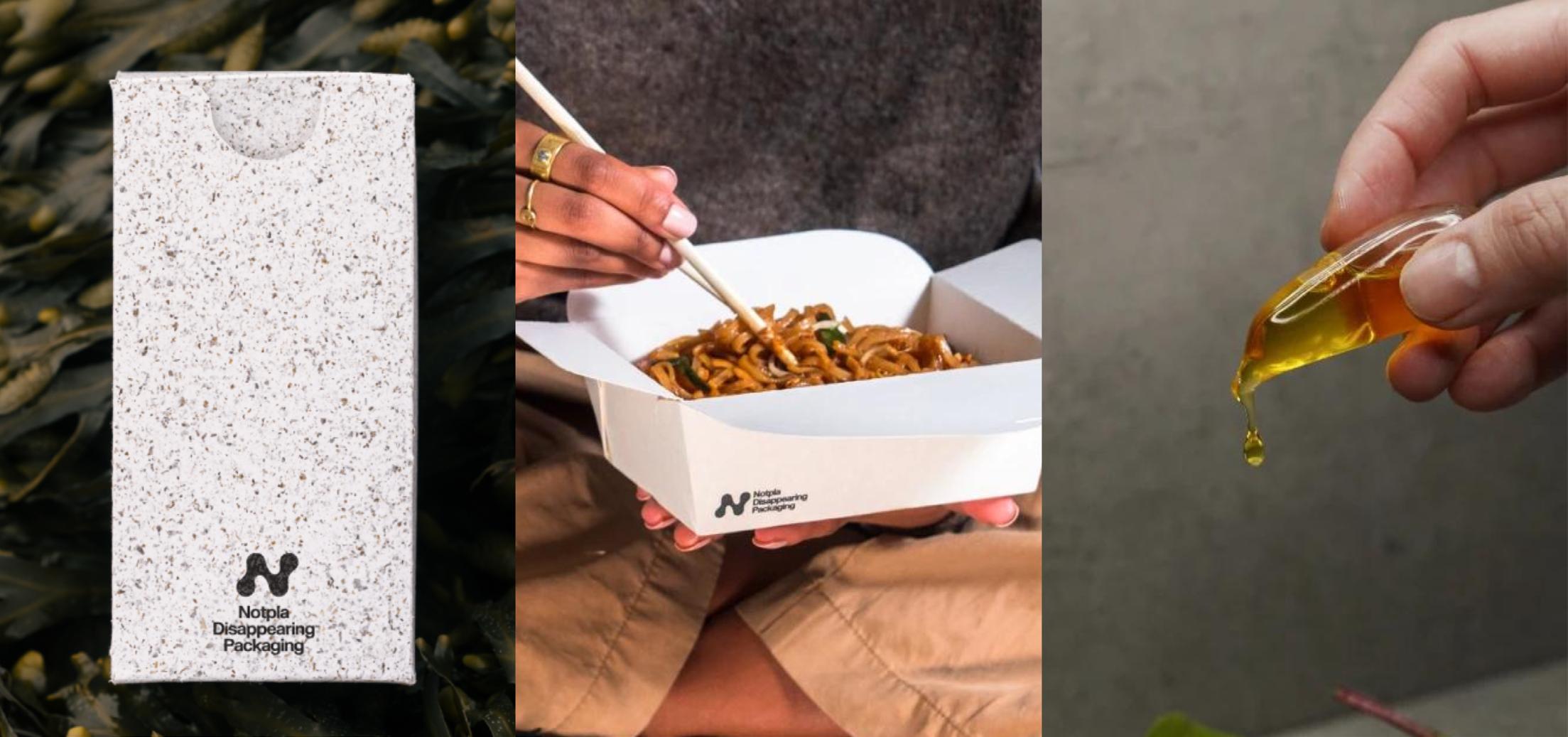
H.D: Excitingly, the Netherlands has been the first nation to certify Notpla as a product that aligns with the UN Plastic directive and can therefore be sold without any form of plastic tax. If other European nations follow suit then this would be huge in limiting the amount of microplastics that are being produced. The UKs single-use plastic ban is similarly a good step in the right direction but allows for a lot more loopholes. At the end of the day, it’s the customers that will help bring change, and we’re seeing a lot of UK businesses happy and willing to change their actions to try and be more sustainable, including paying a premium for products that have a genuine positive impact.
T.K: When our clients get their hands on your packaging, what’s the best way to dispose of it when they’re done?
N.R: Our hierarchy of preference is:
1. Recycle: all of our packaging can enter existing paper waste streams without causing problems (unlike, PLA for example) and the paper fibres can be recovered. This is our first recommendation.





2. Home compost: Throw it into your home compost and it will return to nature in around 6 weeks (often this is much faster, as shown in our in-house wormery where the packaging disappears in under 30 days).





3. General waste: Recognising that, in the real world, there is a high likelihood that food packaging will make its way into general waste, our packaging will return to nature just like a fruit peel leaving no chemicals, toxins, or microplastics behind.





T. K: Thank you so much- I think I speak for everyone when I say I can’t wait to see what Notpla do next.
If you’d like to learn more about Notpla or try the products for yourself, please get in touch with a member of the allmanhall team today or look at the products available to order through Bidfood and at the product codes listed on page 67.



Your guide to new & innovative products, from brands including...
• Notpla
• Devil’s Kitchen
• Rubies in the Rubble
• Fairfields Farm
• Wildfarmed Flour
• Moving Mountains
• Quorn Foods






RUBBIES VEGAN MAYO CRYOVAC POUCH FOR DISPENSING UNIT 3 X 2.5KG
RUBBIES TOMATO CRYOVAC POUCH FOR DISPENSING UNIT 3 X 3KG





FAIRFIELDS ADNAMS GHOST SHIP PALE ALE CRISPS
FAIRFIELDS SEA SALT & ASPALL CYDER VINEGAR CRISPS
ROAST RIB OF BEEF VEGAN CRISPS
X 40G pack


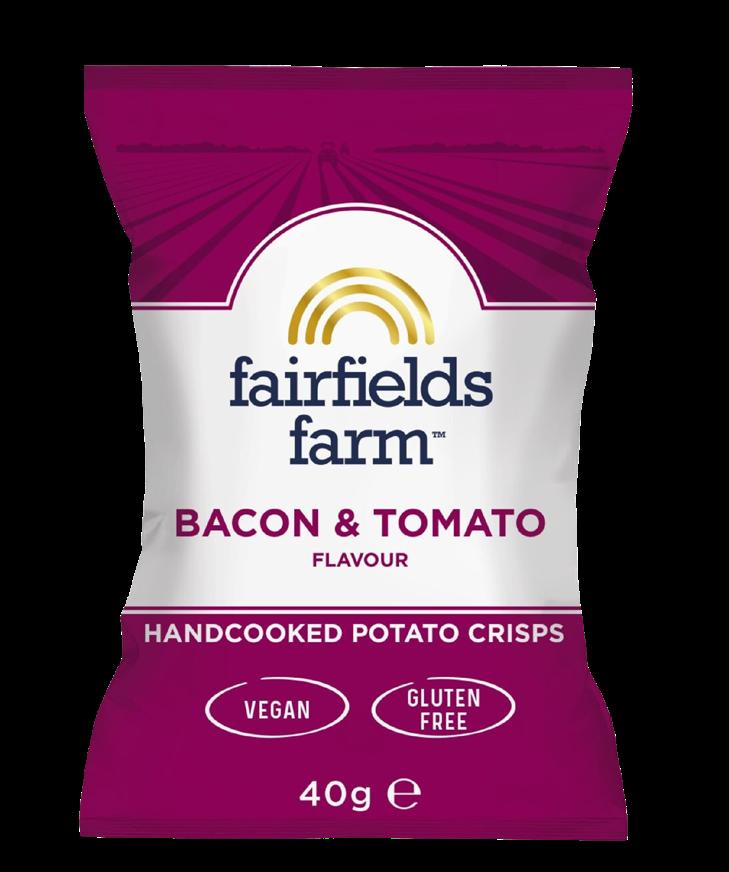


















Ingredients: four servings
• Tinned chopped tomatoes (480g)
• White rice (340g)
• Canned red kidney beans (240g)
• Canned black beans (240g)
• Tomato puree (1.2 tbsp)
• Sweet potatoes (1.6kg)
• Olive oil (1.6 tbsp)
• Dried oregano (1.2 tsp)
• Onions (1.2kg)
• celery (60g)
• Smoked paprika (1.6 tsp)
• Carrots (1 & 1/2)
• Chilli powder (1.2 tsp)
• Dark chocolate (6g)
• Soy sauce (0.8 tbsp)
• Garlic cloves (1 & 1/2)
• Cumin (1.6 tsp)
• Additional toppings...

1. Place the sweet potato in an oven tin & cover with some olive oil, 1 tsp of each cumin and paprika. Mix and roast in the oven on a medium/high heat for 25 minutes.
2. Once done, move the excess oils into a saucepan, over a medium heat & add your carrots, onions & Celery. Cook for 7-9 minutes. Then add the tomato puree & remaining dry spices.
3. Make sure everything is mixed together and then cook for another minute.
4. Add the chopped tomatoes, red pepper & 200ml water. Ensure the chilli is brought to a boil and then let simmer for 20 minutes.
5. Tip in the two types of beans & let cook for another 10 minutes efore adding in your roasted sweet potato.




6. Just prior to turning off your hob, add in your soy sauce & grated dark chocolate for an added rich flavour and make sure to mix well. Serve with white rice and lime wedges, guacamole and coriander if you wish.

Per serving:

At allmanhall we have a culture of growth and development, where we encourage learning and feedback throughout. The New Year provides the perfect opportunity to reflect on the past year and set aspirational goals for the year ahead.
Have you set any goals or commitments for 2024? Here are some of our team’s New Year’s resolutions to help inspire you…
As a food procurement company, it isn’t surprising that a lot of the team’s resolutions are linked to food! Many of the team have set themselves a commitment to eat a more balanced diet that is both nutritious and sustainable. Some are looking to “reduce, but ultimately remove ruminants” from their diet, “go vegan!”, “cut out fast food”, or commit to at least “two vegetarian meals a week”.
One team member is looking to comply with the EAT-Lancet planetary health diet which provides science-based guidance for a diet that is healthy for both people and the planet.


One of our team says “my family are going to challenge ourselves to learn 24 new recipes from 24 different countries!”. Another team member is looking at focussing on quality time and doing something every week, as a family or with close friends, that creates a memory or a new experience.
12 members of the allmanhall team ran the Bath Half in 2023, raising over £3000 for local charity, Jamie’s Farm. In 2024 many of the team are planning to keep up the running and do the Bath Half again in March this year… and one team member has said they’re going to join in and run their very first half marathon!
Our head office is in beautiful countryside in the heart of Wiltshire and a number of the team are looking at ways to increase their daily steps. Some are planning ‘walk and talk meetings’ and one of the team will be “driving less and walking more” to increase fitness and reduce carbon emissions.
Whatever your goals are for 2024, the allmanhall team wish you a prosperous and successful New Year that is full of opportunities and growth!
Author Laura Manley
People and Performance Manager

The food of bookworms - some recommendations for your 2024 reading list!
Seeking a positive and rewarding New Year’s resolution to sustain you through 2024? Let allmanhall’s in-house book worm and foody, Klaire Alexander, point you in the right direction!
This is a fantastic guide to help busy people have a positive impact upon the world around us by simply making little changes and gaining a better understanding of the consequences of our daily choices. Whilst incredibly informative, Jen’s writing style is so warm, engaging and relatable that it is easy to use this book as a reference guide or read cover to cover.
Jam-packed full of ‘Top Tips’ and ‘Quick Win’ tick lists, this book shows us how to assuage eco-anxiety whilst having fun!



Despite beginning his career as a roofer in the Wiltshire countryside, Joe is one of the UK’s biggest online stars and knows better than anyone how it feels to be overwhelmed by the endless stream of digital content.
Using personal stories and quirky hand-drawn illustrations this book is a truly restorative read that gives us creative and practical ways to immerse ourselves in nature and become happier and healthier by doing so.

Author Klaire Alexander Buyer



This book is a little slice of heaven for the New Year as it combines the passion of a fantastic cook with the knowledge of an experienced gastroenterologist. A thorough explanation of the process of digestion and how the food we eat influences the way we feel this is not a dieting book, more an unapologetic celebration of what Saliha believes to be the most amazing organ in the body.
Peppered with simple, delicious and sustainable recipes this book could well be the key to gastronomic happiness in 2024.
As the population of the UK continues to age this is an invaluable new book from cookery legend Rick Stein as it celebrates life’s simple pleasures through an array of delicious recipes.
Rick had the revelation for this book after a worrying open heart surgery operation changed his opinion towards his life and work. His focus turned to simplifying recipes by keeping the number of ingredients down, using leftovers lurking in the fridge or freezer and cutting preparation times – good for the planet, the pocket and the person!
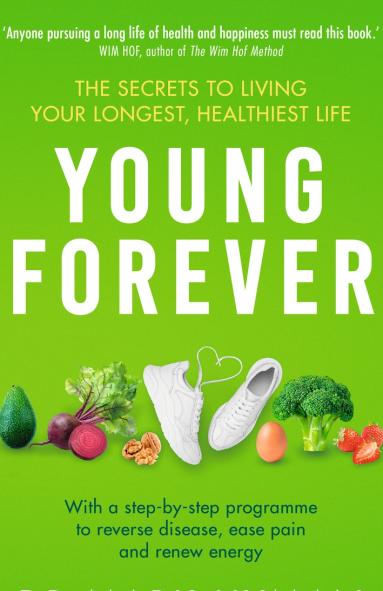

We are all becoming increasingly aware of the detrimental affect that sugar has on our bodies and in this book Dr Mark Hyman helps us to reimagine our biology, health and the process of growing older. The book begins by exploring the signs of aging and their causes and then shows us how to overcome them with his mantra ‘food is medicine’.
As well as guidance on how to support the health of your immune system through exercise and good sleep this book also features Dr Hyman’s Pegan Diet which focuses heavily on plant-based, whole foods and limits processed foods, so there is great advice here no matter what stage you are at on your journey through life.




